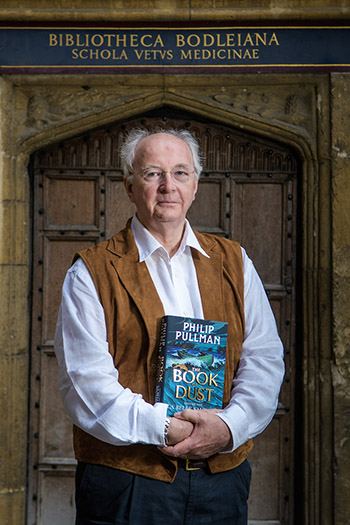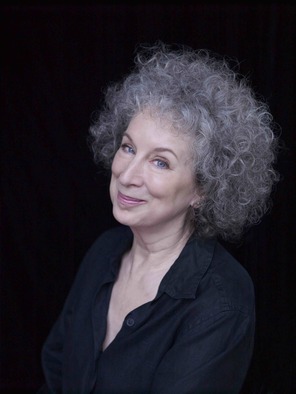
Philip Pullman 
Margaret Atwood
Authors Margaret Atwood and Philip Pullman are two of many genre figures on the United Kingdom’s New Year Honours List for 2019 [PDF file] published December 28.
There is also Michael Palin, launched to fame with the Monty Python troupe; Christopher Nolan, director of numerous sff films like Inception, The Dark Knight, and Interstellar (though I expect 2017’s WWII historical Dunkirk had something to do with the honor); Thandie Newton, whose latest hit is Westworlds; and Sophie Okonedo, an actress with many Doctor Who credits, along with film appearances in Aeon Flux and Martian Child.
ORDER OF ST MICHAEL AND ST GEORGE
KCMG
Michael Edward PALIN CBE FRGS, Comedian, Actor, Writer and Television Presenter. For services to travel, culture and geography
Knights Bachelor
Philip Nicholas Outram PULLMAN CBE, Author. For services to Literature.
ORDER OF THE COMPANIONS OF HONOUR
Dr Margaret Eleanor ATWOOD, Canadian Author. For services to literature
ORDER OF THE BRITISH EMPIRE
CBE
Christopher Edward NOLAN, Director and Filmmaker. For services to film
ORDER OF THE BRITISH EMPIRE
Officers of the Order of the British Empire
Melanie Thandiwe NEWTON Actress. For services to Film and charity. (Thandie Newton)
Commanders of the Order of the British Empire
Sophie OKONEDO OBE Actress. For services to Drama.
Discover more from File 770
Subscribe to get the latest posts sent to your email.

Emma Thompson doesn’t deserve a mention?
Is it just me, or is there something very peculiar about how the top of this article is displaying? (Images cut off at the top and overlaid over the title.)
Owen Whiteoak: Emma Thompson was on the Birthday Honours list in June.
Heather Rose Jones: I wouldn’t be surprised. The new WordPress 5.0 release has either deleted or hidden somewhere I have yet to rediscover the tools I used to have for fine-tuning what they call a “gallery” — used to present images side-by-side, etc. So I couldn’t adjust the dimensions of these pictures. They looked fine on my screen — but I don’t think too many of you are going to run out and buy a new computer so we’ll all have the same screen….
I am delighted to learn that Michael Palin is a Fellow of the Royal Geographic Society.
Lord knows, the man has covered enough ground (and water) to be given his membership without question!
@Heather Rose Jones
I’m not seeing that. (That’s an interesting doorway Pullman is standing in front of. “Bodleian Library Old School of Medicine”?)
Could someone explain or point me to a quick explanation of the levels or degrees of those different honors? Specifically at which point someone starts being called Sir or Dame?
Mike – my apologies – it was indeed the Q’s Birthday Honours List. I blame the BBC, which illustrious organisation included her in their report of the New Year’s Honours. But my memory and fact-checking nodes let me down.
How does Margaret Atwood get a British title? I thought Canadians weren’t allowed to accept British honors!
Owen Whiteoak: No problem, and there may still be something I missed… I only had three names when I started working on the post, and doubts about one of them. While there is more than one government document available online to consult, where I started, one of those names isn’t on the long list, but shows up on another short list. While scrounging around the media for more hints I found the other names I ran in the item.
@cmm: (from pieces of Wikipedia I’ve periodically poked through in my own puzzlement; my assumption is that there are enough people Very Serious about this that inaccuracies would be stomped on. They’re good about connecting initials to extensive articles, so finding data isn’t hard.) Some of the orders have 5 levels, in which the names identify who is a knight/dame; e.g., {Member, Officer, Commander, Knight/Dame Commander, Knight/Dame Grand Cross} of the Most Excellent Order of the British Empire. Others are more compressed but still clear, e.g. Michael & George has Companion and 2 levels of Knight while Garter and Bath (as I read) are all Knights/Dames. AFAICT, the Sir/Dame prenomen (if it’s omitted) can be inferred from the initial K/D in the alphabet soup after the name — although there are also Knights Bachelor (e.g., Pratchett and Pullman) who are Sir Xyz but not as part of an order and so don’t get the initials (although both have previous awards they’re entitled to append to their names). Who gets what is a judgment call that probably has a number of full-time disputants; e.g., despite obvious-to-viewers cause, the protagonist of The King’s Speech never achieved his desire to be called Sir.
@Martin Wooster: Atwood has entered an order with a large number of non-UK Commonwealth members, although the Wikipedia listing also cites some UK citizens (subjects?).
Martin – Companion of Honour is allowed for non-Brits. In much the same way that an Irishman like Bob Geldoff can receive a knighthood but is NOT to be addressed as “Sir Bob”. On pain of being looked down the nose at. Hey, I didn’t make the rules.
Cmm – A (British) knight or baronet is addressed as “Sir”. Dame is the female equivalent. The knight / dame titles are not inherited and cease on death. Baronetcy is a hereditary knighthood. These remain commoners, however – none is a peer of the realm (of noble rank). Honours like OBE, CBE, KBE etc. go after the name, like academic titles.
The rundown of peerages (probably incomplete and inaccurate) goes
(Royal Family) –
Sovereign – King / Queen or Queen / Prince Consort;
princes and princesses are usually also given duchies, to become Royal Dukes and Duchesses
non-Royal Duke / Duchess
Marquess (Marquis or Margrave) / Marchioness
Earl / Countess (Earl is a similar rank to a European Count; Thane in Anglo-Saxon England and in ancient Scotland)
Viscount / Countess
Baron / Baroness
As Lady Macbeth so memorably said: “I’m afraid His Grace seems to be having one of his funny turns. Stand not on the order of your going, but just fuck off, will you?”
(not aimed at anyone on this board – I’m only quoting the reports).
Owen: Thanks for the explanation.
Expanding on Owen’s list a bit, hereditary peerages are no longer awarded except in very special cases. The last I can remember was George Thomas who became Viscount Tonypandy when he retired as Speaker of the House of Commons, he was unlikely to produce an heir and the title died with him.
Barons and Baronesses these days are Life Peers, they get a seat in the Lords for life but the titles are not inherited.